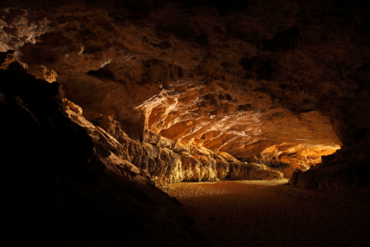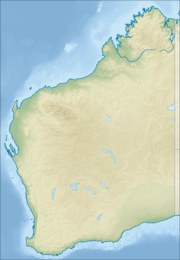Drovers Cave National Park facts for kids
Quick facts for kids Drovers Cave National ParkWestern Australia |
|
|---|---|
|
IUCN Category II (National Park)
|
|

Stockyard Gully Cave exit in Drovers Cave National Park
|
|
| Nearest town or city | Jurien Bay |
| Established | 1972 |
| Area | 26.81 km2 (10.4 sq mi) |
| Managing authorities | Department of Environment and Conservation |
| Website | Drovers Cave National Park |
| See also | List of protected areas of Western Australia |
Drovers Cave National Park is a special protected area in Western Australia. It's about 201 kilometers (125 miles) northwest of Perth. The small town of Jurien Bay is only 6 kilometers (3.7 miles) to the west. This park is a great place to explore nature and learn about history.
Exploring the Caves of Drovers Cave National Park
Drovers Cave National Park is made of limestone. This is a type of rock where many caves can form. There are lots of caves hidden within the park! To keep everyone safe and protect these amazing natural places, many caves have special screens or gates. This helps stop people from getting hurt or damaging the caves.
Besides Drovers Cave, you can find other caves like Hastings Cave, Moora Cave, Old River Cave, and Mystery Cave. Hastings Cave is extra special because it holds fossils. These are like ancient clues about life from long ago!
A Look at the Park's History
Drovers Cave was well known to early explorers and stockmen. These were people who moved cattle across the land. The park's location was near the Canning Stock Route. This was a long path used for moving livestock. Because of this, drovers often visited the cave, which is how it got its name.
The first known visit to the cave by a drover was in 1886. This drover even signed the cave wall! Many more visits happened between 1930 and 1940. Experts carefully mapped the cave in 1973. It became part of the National Park in the same year.
Plants and Animals of Drovers Cave National Park
Drovers Cave National Park is home to many interesting plants. You can see shrub banksia, which have unique flowers. There's also one-sided bottlebrush and parrot bush. These plants add to the park's natural beauty.
The park is also full of amazing animals. You might spot large emus walking around. Smaller creatures include honey possums and western pygmy possums. These tiny marsupials are very cute! You could also see short-beaked echidnas, which are spiky mammals.
Larger animals like western grey kangaroos hop through the park. Birds like Australian bustards can be seen too. The park is also home to many different reptiles. It's a great place to observe Australian wildlife in its natural habitat.
 | Georgia Louise Harris Brown |
 | Julian Abele |
 | Norma Merrick Sklarek |
 | William Sidney Pittman |


